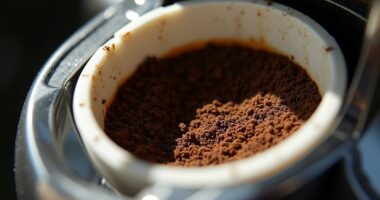If your coffee tastes super bitter, it might be due to over-extraction, the roast level, or the beans’ quality! Too fine a grind or too hot water can pull out those bitter flavors. Plus, dark roasts can pack a punch of bitterness too! Remember that caffeine plays a role in this bitter taste party too. Think of it like biting into a lemon instead of savoring a smooth cup! Stick around, and you’ll uncover more coffee secrets!
At a Glance
- Over-extraction from a fine grind or prolonged brewing time can lead to excessive bitterness in coffee.
- High roasting temperatures or extended roasting times can result in a bitter flavor profile.
- Chlorogenic acids and quinides formed during roasting contribute significantly to coffee’s bitterness.
- Caffeine enhances the perception of bitterness, making your coffee taste more bitter than it is.
- Water temperature and grind type greatly impact extraction, influencing the overall bitterness of your brew.
Understanding Coffee Bitterness
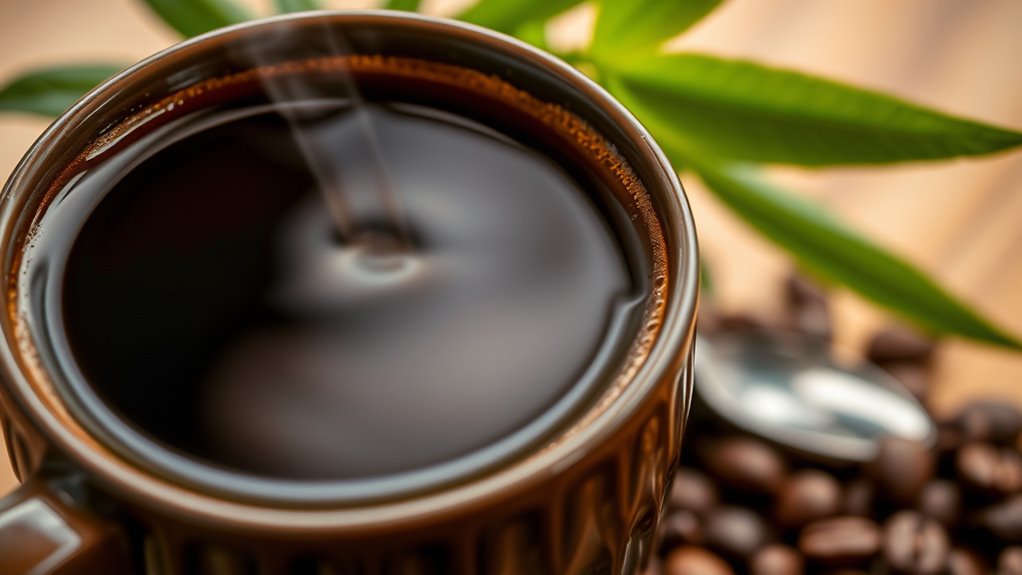
When you take that first sip of coffee, you might think, “Wow, this is bitter!”
But don’t worry, bitterness isn’t always a bad thing. It’s all about that sweetness and acidity balancing the bitterness, creating flavor complexity. You’ve got chlorogenic acids and caffeine contributing to that zing, but it’s the balance that matters.
If your cup’s too bitter, maybe it’s over-extracted or you used a grind that’s too fine. Next time, try a coarser grind or adjust your brew time. Additionally, ensure you’re using the right water temperature, as it can significantly impact the extraction process.
Finding that perfect blend can turn your morning ritual into a delightful experience, rather than a bitter wake-up call!
The Role of Roasting in Bitterness Development
Roasting coffee is like a wild dance of flavors, where temperature and time take center stage!
You see, those roasting techniques really matter. If you crank up the heat or roast too long, you might end up with a bitter cup—yikes! It’s all about roast consistency, folks.
Each bean has its sweet spot, so knowing when to stop is key. Light roasts keep things bright and zesty, while dark roasts can plunge into bitter territory. Additionally, the best tasting ground coffee often results from a careful balance of roast levels that highlight the inherent flavors of the beans.
Key Compounds Contributing to Bitterness
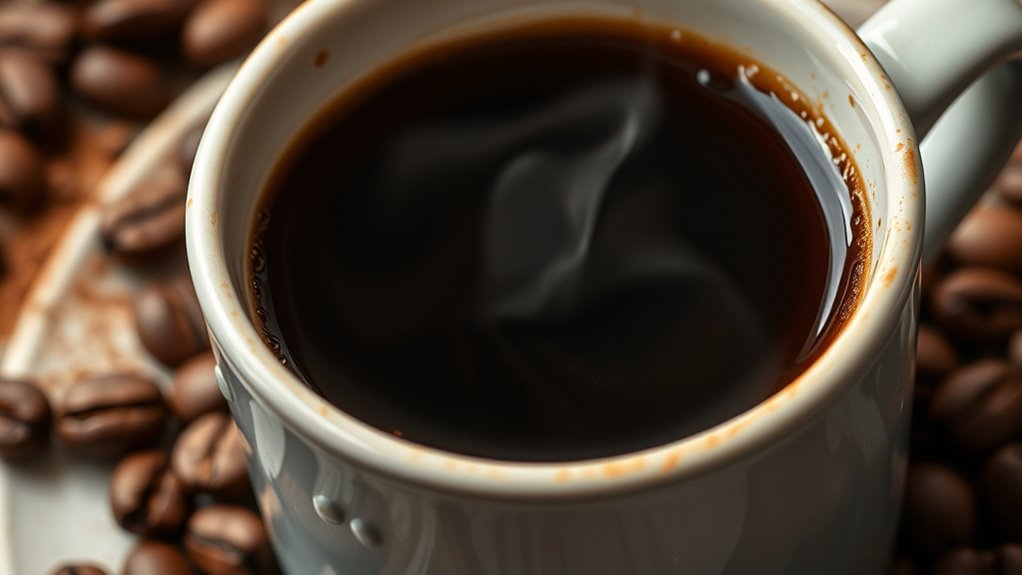
Ever wondered why some cups of coffee have that delightful kick while others might make you cringe? Well, it’s all about those sneaky compounds!
Chlorogenic acids are the culprits that turn bitter when roasted, creating lactones and phenylindanes. These guys pack a punch in bitterness, especially in decaf!
Then there are quinides, which are intense bitter compounds that add even more zing. You mightn’t notice them, but they can make up to 80% of decaf’s bitterness! Additionally, the finest Colombian coffee beans are known for their balanced flavor profile, which can help mitigate bitterness in your cup.
Genetic Factors Influencing Bitterness Perception
You mightn’t realize it, but your genes play a sneaky role in how you taste coffee, especially when it comes to that bitter kick!
Some folks have genetic variants in their receptor genes, like TAS2R38, making them super sensitive to bitterness. This means while you might love a bold brew, a friend could be grimacing at the same cup!
Some people carry genetic variants that heighten their sensitivity to bitterness, making coffee preferences wildly different from one person to the next!
It’s all about taste perception and how those genes interact with caffeine metabolism. If you’re curious, genetic testing can reveal your bitterness sensitivity, paving the way for personalized coffee recommendations. Additionally, the grind size you use can also influence the extraction process, impacting the overall flavor profile of your coffee.
Who knew your taste buds had such a complicated backstory?
Caffeine’s Contribution to Bitter Taste
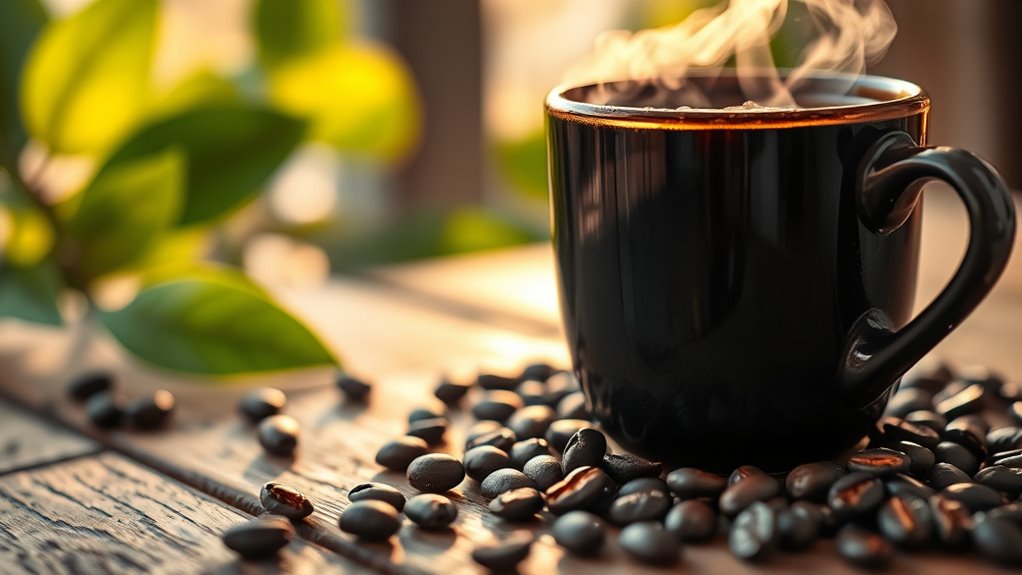
When you take a sip of that bold cup of coffee, it’s not just the caffeine giving you that jolt; it’s also the bitterness that comes along for the ride!
Caffeine interacts with caffeine receptors, activating bitterness mechanisms that make your taste buds tingle. Here’s what you might find interesting:
- Caffeine’s not alone—other compounds join the bitterness party!
- Your genes play a role in how bitter you perceive caffeine.
- That bitter kick can even boost your gastric secretions!
Additionally, the quality of the coffee bean’s flavor profile can significantly influence the overall bitterness of your brew.
The Impact of Roasting Time and Temperature
Roasting time and temperature can totally make or break your coffee experience!
Imagine biting into a bitter chocolate instead of enjoying a smooth, rich brew. If roasters play around with roasting techniques, they can create perfect flavor profiles.
Too long and you’ll get harsh phenylindanes that scream “bad coffee!” But, just the right time brings out those velvety chlorogenic acid lactones, making every sip delightful.
Perfect timing in roasting reveals velvety flavors, while overdoing it unleashes harsh bitterness.
Higher temps can caramelize sugars, but go too far, and bitterness takes over. The ideal water temperature for brewing coffee is crucial, as it can significantly influence the extraction of flavors and compounds during the brewing process.
The Complexity of Chemical Diversity in Coffee
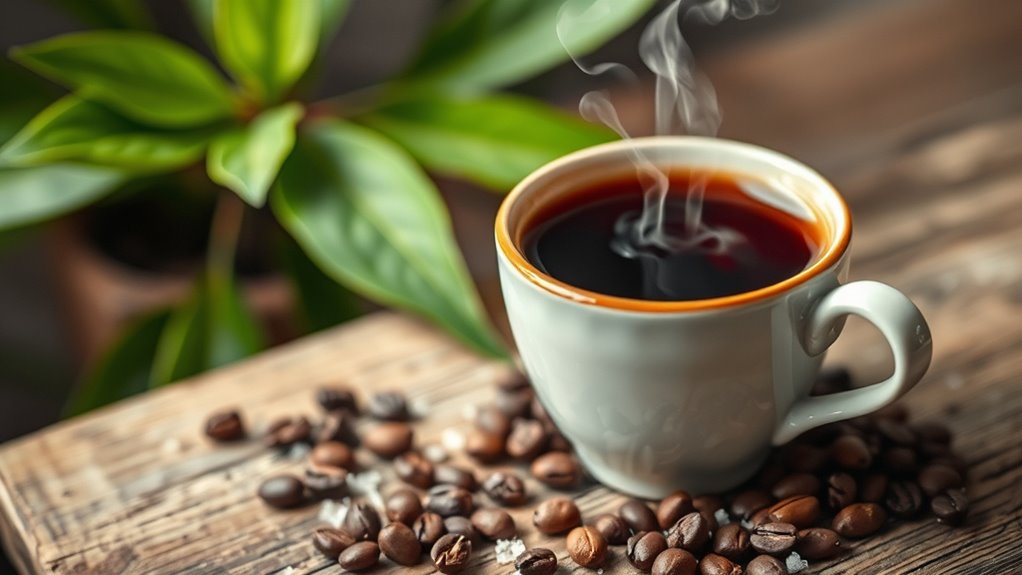
Coffee’s flavor is a wild ride, and its complexity comes from a crazy mix of chemicals that dance together in your cup.
You mightn’t realize it, but these chemical reactions and receptor interactions create the bitter notes you love—or loathe!
Here’s what’s happening:
- Different genes, like *TAS2R43*, totally change how you taste bitterness.
- Roasting transforms sour chlorogenic acids into velvety flavors or harsh notes, depending on the temp.
- Your taste buds’ density can make you a bitterness super-taster or a casual coffee fan.
- The grind type options you choose can also impact the extraction process and ultimately affect the bitterness of your brew.
Sensory Preferences and Coffee Consumption Behavior
Ever noticed how your coffee preferences can get as personal as your favorite pair of socks? Your sensory thresholds can shape your taste, making bitterness feel like a friend or foe.
Maybe you grew up in a culture that swears by strong, bold brews, while others fancy smoother sips. It’s fascinating how age and experience can tweak your coffee game too! The type of coffee beans and their unique flavor profiles can significantly influence bitterness levels.
Daily rituals, from that morning cup to afternoon boosts, all play a role in defining what you love.
Just remember, whether you’re a bitter lover or a smooth sipper, your coffee journey is uniquely yours—cheers to that!





